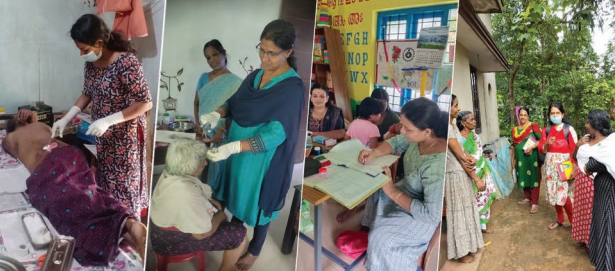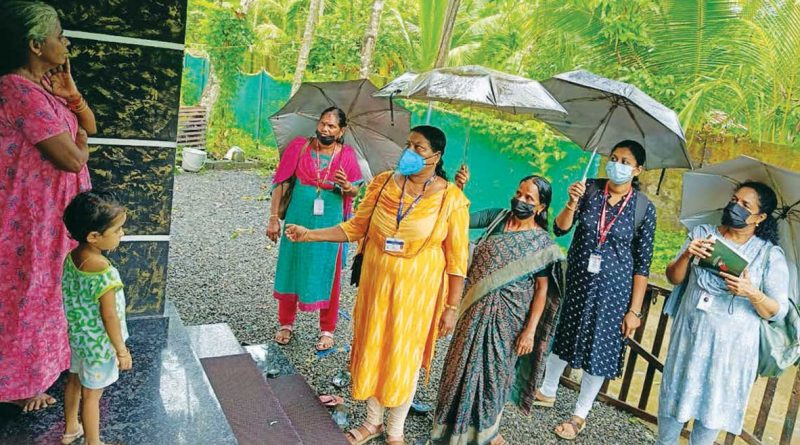Making the State Proud

The army of health sector field workers in the State comprises the Accredited Social Health Activists (ASHA) workers, the health inspectors and the public health nurses. Though the ASHA workers are not one among the salaried permanent staff of the State’s Health Department (they are given an honorarium), they are an integral part of the corps of the health sector field workers along with the health inspectors and public health nurses. They have been deployed after providing them with the required training. Dr. Vyas Sukumaran, the National Health Mission programme officer for Kottayam and Ernakulam districts, said that in spite of the absence of a permanent staff tag, the ASHA worker remains the prime grassroots level field staff of the Health Department- “in fact they are full time field level health workers given the Kerala situation and there is one ASHA worker for each ward in the State.” Dr. Vyas said that the basic duty of the ASHA worker is carrying out house to house visits and updating their immediate superiors of the Health Department on any health concern developments detected. They form vital links between the community and the Health Department vis-à-vis a health alert and consequent intervention if needed especially when it comes to the outbreak of any communicable or epidemic diseases. “They serve as surveillance agents of the health department constantly monitoring the community’s health landscape, detecting early warnings of potential health issues and providing critical insights to take swift action and timely interventions”, said Dr. Vyas.
 The health sector reforms introduced by the Kerala Government which took roots in 2017 had revolutionised the role of the ASHA workers. Through the reforms, the Primary Health Centres were upgraded to Family Health Centres (FHC) with additional staff and better infrastructure. The FHC is the place from where the initial medical doctor level treatment is imparted and there is one for each grama panchayat on the lines of a family doctor concept. Below the FHC, sub-family health centres are coming up on the basis of one such sub centre for two or three wards based on the population. The sub centres will be health care centres manned by health sector field workers in the rank of health inspectors and public health nurses. It will be through the sub centres that preventive measures like immunisation plus family planning programmes are being coordinated and carried out.
The health sector reforms introduced by the Kerala Government which took roots in 2017 had revolutionised the role of the ASHA workers. Through the reforms, the Primary Health Centres were upgraded to Family Health Centres (FHC) with additional staff and better infrastructure. The FHC is the place from where the initial medical doctor level treatment is imparted and there is one for each grama panchayat on the lines of a family doctor concept. Below the FHC, sub-family health centres are coming up on the basis of one such sub centre for two or three wards based on the population. The sub centres will be health care centres manned by health sector field workers in the rank of health inspectors and public health nurses. It will be through the sub centres that preventive measures like immunisation plus family planning programmes are being coordinated and carried out.
Together with the ASHA workers they form the field level workers of the State’s health sector. The Asha workers are the link for the community with the sub centres, the FHC and the Block Panchayat level health centres. There are several key factors that have enabled Kerala’s health workers to set a benchmark for others to follow. Kerala’s health system emphasises primary health care, which serves as the foundation for its public health achievements. Health workers in Kerala operate within a decentralised healthcare structure, ensuring that even the most remote villages have access to basic medical services. This grassroots-level focus allows for early detection and prevention of diseases, significantly reducing the burden on tertiary care facilities. Kerala’s field level health workers have successfully fostered a strong bond with the communities they serve. This trust is built on consistent and reliable healthcare delivery, along with effective communication. Health workers actively engage with local populations through health education campaigns, vaccination drives, and regular health check-ups. The involvement of local self-governments and community health volunteers has further strengthened this bond, ensuring widespread participation in health initiatives.
 Innovation is yet another hallmark of Kerala’s approach to healthcare. During the Nipah virus outbreak in 2018 and the COVID-19 pandemic, Kerala’s field level health workers demonstrated exemplary crisis management skills. They swiftly implemented contact tracing, quarantine measures, and community surveillance, effectively containing the spread of these diseases. The use of technology for telemedicine, digital health records, and mobile health units has also enhanced the reach and efficiency of healthcare services in the state. After benefitting from a robust training and support system, Kerala’s field level health workers serve as the eyes and ears of the Health Department. Continuous professional development programmes have ensured that they are well-equipped to handle emerging health challenges. The state’s health department provides regular training sessions on disease management, maternal and child health, and public health emergency response. Additionally, mental health support for health workers, especially during crises, has been a priority, recognising the psychological toll of their demanding roles. Kerala’s health workers address medical and social determinants of health, collaborating with various government departments on nutrition, sanitation, and education. This holistic approach makes health interventions more effective and sustainable. Programmes for maternal and child health, combating malnutrition, and promoting healthy lifestyles have significantly improved public health indicators. Equity and inclusivity are central to Kerala’s healthcare model. Field-level health workers deliver services without discrimination, ensuring marginalised communities, including tribal populations and the urban poor, receive adequate care. Special programmes for vulnerable groups, such as the elderly and differently-abled individuals, highlight Kerala’s commitment to inclusive healthcare.
Innovation is yet another hallmark of Kerala’s approach to healthcare. During the Nipah virus outbreak in 2018 and the COVID-19 pandemic, Kerala’s field level health workers demonstrated exemplary crisis management skills. They swiftly implemented contact tracing, quarantine measures, and community surveillance, effectively containing the spread of these diseases. The use of technology for telemedicine, digital health records, and mobile health units has also enhanced the reach and efficiency of healthcare services in the state. After benefitting from a robust training and support system, Kerala’s field level health workers serve as the eyes and ears of the Health Department. Continuous professional development programmes have ensured that they are well-equipped to handle emerging health challenges. The state’s health department provides regular training sessions on disease management, maternal and child health, and public health emergency response. Additionally, mental health support for health workers, especially during crises, has been a priority, recognising the psychological toll of their demanding roles. Kerala’s health workers address medical and social determinants of health, collaborating with various government departments on nutrition, sanitation, and education. This holistic approach makes health interventions more effective and sustainable. Programmes for maternal and child health, combating malnutrition, and promoting healthy lifestyles have significantly improved public health indicators. Equity and inclusivity are central to Kerala’s healthcare model. Field-level health workers deliver services without discrimination, ensuring marginalised communities, including tribal populations and the urban poor, receive adequate care. Special programmes for vulnerable groups, such as the elderly and differently-abled individuals, highlight Kerala’s commitment to inclusive healthcare.


